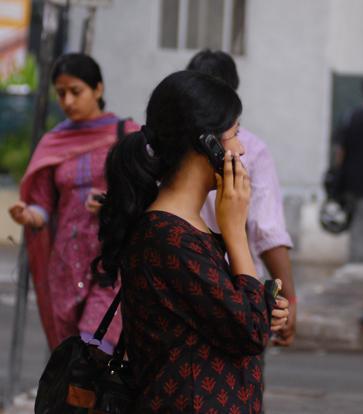New Delhi, Dec 23 The lack of adequate spectrum, or radio frequency, for mobile phone operators for the better part of the year, due to delays in auction resulted in poor voice quality and call drops in 2014, even as the wait got longer for the people to migrate to superior 4G for broadband services.
The lack of spectrum got further exacerbated with local administrations delaying permissions for setting up mobile towers while some groups kindled fear among the people over the ill-effects of radio waves emitted from such infrastructure over their health. This too spoilt service quality.
“This was a troubling year. Most problems, especially relating to spectrum and licensing remained pending. But with defence’s decision to release spectrum, some of pending issues should be easier to resolve,” said Mahesh Uppal, director of telecom consultancy firm Com First.
The year actually began on a good note for the industry. The government mopped up Rs.61,162 crore ($10 billion) by auctioning airwaves in two bands for mobile phone and broadband services. This was given away in February. But since then no further release of spectrum took place.
Highlights of telecom sector in 2014:
# Auction of spectrum in February for mobile and data fetches $10 billion.
# No further auction conducted during the year.
# Several court orders say fears over ill-effects of mobile tower radiation misplaced.
# government announces “Digital India” campaign to wire India with $16 billion investment.
# Regulator gives recommendations for spectrum trading and sharing.
# Host of pacts signed for sharing of telecom towers.
Meanwhile, the telecom subscriber base continued to grow from 915 million at the beginning of the year to 963 million by end-October, while that for broadband rose from 55 million to 73 million. The overall tele-density also increased from 74 percent to 77 percent.
Yet, with little addition to spectrum with service providers, quality suffered. Little wonder, some 136 million people resorted to mobile number porting, or changed their service providers, akin to the entire population of Russia, Japan or Mexico opting for an alternate operator.
Nevertheless, there were several pacts among service providers to share the infrastructure.
“There was nothing much on long-term evolution front,” Rishi Tejpal, principal research analyst, Gartner, told IANS, referring to an industry jargon to describe high-speed data communications, using wireless technology, notably 4G.
“People expected to see some more movements in 4G. Only Bharti Airtel added a few cities in its 4G radar. Other than that there was not much traction. Non-availability of affordable devices for 4G can also be seen as one of the reasons for this slow movement,” Tejpal said.
“In the 2G and 3G space, operators are gaining margins as they have hiked prices and taken some freebies off. Operators are focusing on post-paid than pre-paid customers. The markets is moving more towards maturity — customer retention is what they are looking at,” he added.
He said expectations were high that Reliance Jio Infocomm will launch 4G by mid-2015.
The 2G case in courts, involving former telecom ministers, among others, also dragged on. “Given the complexity, and the number of people involved, it is unlikely the matter will be concluded in 2015,” said Rajan S. Mathews, director general, Cellular Operators’ Association of India (COAI).
“But the case has little impact on the industry at present,” he told IANS.
Moving ahead, the stakeholders hope the auction of spectrum will be done in the first quarter of next calendar year. They also hoped for some traction to be generated by Prime Minister Narendra Modi’s “Digital India” programme to wire up the country at an investment of $16 billion.
“Infrastructure for this programme is crucial, especially in the form of availability of towers. Misplaced fears have to be allayed. Proper norms are also required for timely clearances. Without requisite infrastructure the dream of “Digital India” will remain a pipe dream,” Mathews said.
Aparajita Gupta / IANS






